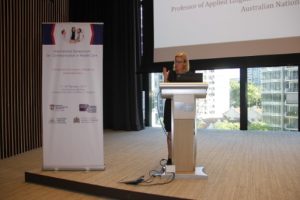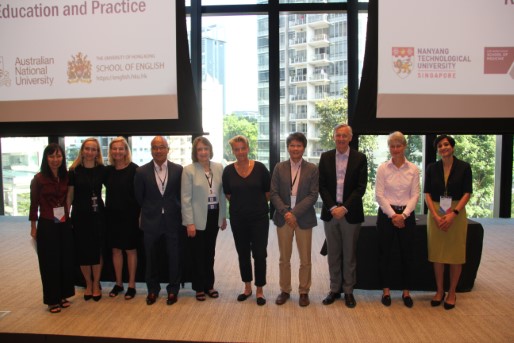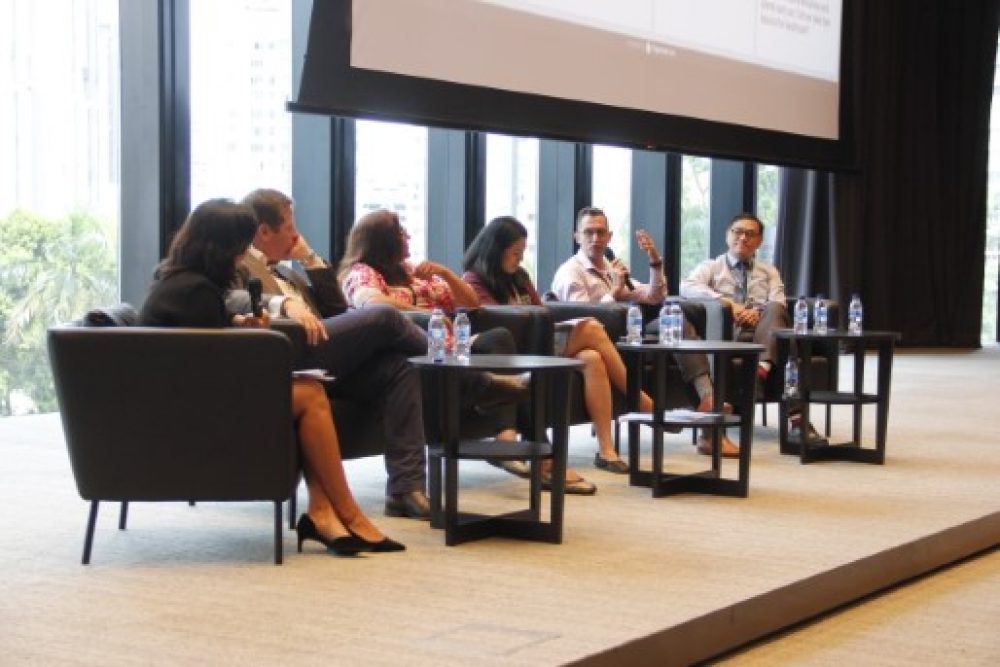Published by Nanyang Technological University, February 14, 2019
In recognition of the critical role that humans play in delivering effective communication, the International Symposium on Communication in Health Care 2019 adopted the theme “The Human Dimension in Medicine and Health Care”. The symposium was organised by Nanyang Technological University’s School of Humanities (SoH) and Lee Kong Chian School of Medicine (LKCMedicine), with organising committee members from NTU’s Wee Kim Wee School of Communication and Information, Tan Tock Seng Hospital; and support from Australian National University (ANU), the University of Hong Kong (HKU) and Harvard University. This was the first time that the symposium was held in Singapore. The past editions were held in countries that included Australia, Hong Kong and Switzerland.
Held at the Clinical Sciences Building on 11 and 12 February 2019, the symposium was attended by more than 130 healthcare professionals, clinicians, linguists, communications scholars and educators from around the world. They gathered to share their ideas, experiences and the latest research findings based on the theme. Besides wide-ranging presentations by experts, the symposium also featured two Stakeholders’ Panels where participants exchanged their views and opinions on two topics – Patient-Centred Care and End-of-Life Care.
The key people involved in organising this year’s symposium included Professor Kang Kwong Luke, the Chair of SoH; Professor Diana Slade, Professor of Applied Linguistics and Director of Institute for Communication in Health Care, ANU; Professor Naomi Low-Beer, Vice Dean (Education) and Dr Tanya Tierney from LKCMedicine; and Dr Elizabeth Rider, Director of Academic Programs, Institute for Professionalism and Ethical Practice, Boston Children’s Hospital and Director for International Charter for Human Values in Healthcare.
The presentation topics dealt extensively on various communication issues that could impact the provision of healthcare as well as how the advent of new technology, including the use of social media, could improve the way practitioners communicate with their stakeholders. There were also presentations that dealt with new developments in communications practice.
A team led by NTU Professor Kang Kwong Luke shared a paper that introduced the practice of in-situ research into communication and interaction in medical settings, an area that is already widely pursued in Europe and the United States. The paper delved into the realities of communication and interaction in local settings, while exploring multiple challenges and opportunities in this area.

Professor Diana Slade and Dr Suzanne Eggins from ANU recognised that communication problems could contribute to poor outcomes for patients who are transferred from acute care in hospitals to primary care in homes. Their presentation offered a critical analysis of communication sequences leading up to discharge recorded between patients and healthcare staff in the emergency department of an Australian hospital. They also shared how linguists can be engaged to improve discharge communication practices.
NTU Professor May O. Lwin’s presentation was based on an assessment of families looking after those with disabilities. She shared on the development of a mobile-based system, which is being pilot-tested, that could generate social networks to provide psychological support for caregivers. Associate Professor Olga Zayts from HKU touched on how genetic professionals could contribute positively to counselling family members who lost their loved ones in sudden unexpected deaths.
LKCMedicine Professor Naomi Low-Beer recognised that communication is critical for effective teamwork as it affects not only the quality of working relationships but also patient safety. Her presentation focussed on how medical schools could innovate ways such as a medical education programme that could prepare young doctors-to-be for corroborative, patient-centred practice of the future. She also facilitated the two Stakeholder Panel sessions at the symposium.
In her presentation, Professor Elizabeth Rider from Harvard stressed that the human dimensions of care – core values and skilled communications – are fundamental to the practice of compassionate, safe relationship-care but yet they are not getting enough emphasis to make them central to every healthcare encounter. She proposed that the International Charter for Human Values in Healthcare could be a foundational framework for teaching and practice to remedy this.
There was also a poster presentation by the participants on topics such as Communication and Conflict Management, Cancer Fatalism and Career Prevention Behaviours in Singapore as well as an art exhibition and graphic medicine display created by medical and humanities students under the supervision of Assistant Professor Graham Matthews from the School of Humanities.
In his opening speech at the symposium, LKCMedicine Dean Professor James Best highlights the role communication plays in the School’s curriculum: “At LKCMedicine, we have always placed right from the start a very strong emphasis on communication in the medical education programme. It starts with the admission process, with the Multiple Mini Interviews that we weigh heavily on, much more than other medical schools here in Singapore. We see that as an objective test of communication skills. We also have Team-Based Learning which is based on having good communication skills, and we have an integrated medical communication component running right through the five years in the school’s curriculum.”
“Good communications in healthcare also covers communication between healthcare providers and in particular between doctors. One of my favourite pieces of advice to newly graduated doctors during their internship is that more mistakes are made by not asking than by not knowing,” he added.
The symposium also witnessed the launch of the International Consortium for Communication in Health Care: Research, Education and Practice, a multiple-partner grouping comprising partners NTU, ANU, HKU and Harvard Medical School.
The next symposium will be held in Hong Kong, February 2020.


